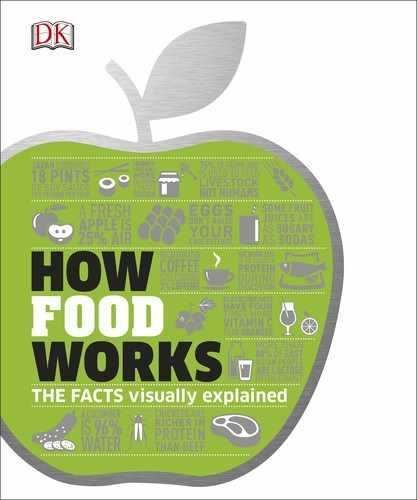
DIETS
Ethical and religious diets
Religious and
ethical diets
Many people, in all parts of the world, make diet
choices based not just on taste and health, but on
their ethical or religious beliefs. Whether we follow a
doctrine-defined set of laws, or a few self-imposed
guidelines, we each express our individual convictions
through the types of food and drink we consume.
DO CHRISTIANS
PERMIT ALL FOODS?
No, some follow religious
dietary laws, too. Mormonism
prohibits alcohol and caffeine,
and during the 40 days of Lent,
Christians deny themselves
luxury food or drink
as penance.
Religion
Food conforming to
Muslim laws is called “halal,”
meaning “allowed.” Animals
must be killed by a Muslim
using a single motion to the
throat with a very sharp
knife. Observers do not eat
or drink in daylight during
the month of Ramadan.
“Kosher” foods conform to
Jewish dietary laws. Kosher
animals must be killed
using a single motion to
the throat with a very sharp
knife. During the festival of
Passover, Jewish people
are forbidden from eating
leavened (yeast-risen) bread.
Because of their belief in
nonviolence, Buddhists are
often vegetarian or vegan,
although this varies with
cultures. Some Buddhist
monks beg for their food
and may eat meat if it is
given to them, as long as
it was not killed for them.
ISLAMJUDAISMBUDDHISM
Permitted
Permitted
Religion-based diets
Food and dining practices play an
important part in most religions,
both as expressions of religious
piety and group identity. While
religions share some similar
practices, most have their own set
of laws that dictate what types of
food and drink they may, and may
not, consume. Guidelines for food
preparation, including animal
slaughter, are also followed. For
some religions, particular days of
the week and times of the year also
have special dietary significance.
HINDUISM
As Hinduism is aligned
with the concept of
nonviolence to all
beings, the Hindu diet
is mostly vegetarian.
However, many Hindus
do eat meat and animal
products, and regional
differences in diet exist.
Jains follow an ancient Indian
religion with the principle of
nonviolence at its core. They go
out of their way to avoid harming
any living creature and
eat a very strict
lacto-vegetarian
(egg-free)
diet. They also
exclude onions,
garlic, and root
vegetables that
are necessarily
killed when
harvested.
JAINISM
Fish with fins and
scales; shrimp—
according to
some authorities
Chicken and other
birds (other than
birds of prey)
Fish with fins
and scales
Chicken and other
birds (other than
birds of prey)
Dairy foods
Dairy foods
US_186-187_Ethical_and_religious_diets.indd 186 18/01/2017 09:47
186 187
DIETS
Ethical and religious diets
PermittedPermitted
Ethical diets
Our ethical beliefs can affect
what foods we choose to eat
and how we source them. Most
vegetarians don’t eat meat
because they believe killing
animals for food is unethical.
Similarly, many people express
ethical concerns about issues
surrounding food production
when choosing food.
Forbidden
Animal welfare
Some people avoid
factory-farmed meat
or eggs, or other meat or
animal products that they
consider to have been
produced inhumanely.
Environment
People address issues
concerning land use
and global warming
by avoiding red meat,
which does the most
environmental damage.
Sustainability
Avoiding some foods—
such as types of fish—
can slow the depletion of
these resources, allowing
stocks to recover.
Waste
People that have ethical
concerns about food
waste include so-called
“freegans” who live
off discarded food.
Animals with cloven
hooves that chew
the cud (cows, goats,
sheep, deer)
Permitted animals
slaughtered
according to
halal principles
Animals not
slaughtered
according to
halal principles
Pigs, shellfish,
fish without scales
Blood Alcohol
Animals with cloven
hooves that chew
the cud (cows, goats,
sheep, deer)
Permitted animals
slaughtered
according to
kosher principles
Animals not
slaughtered
according to
kosher principles
Pigs, shellfish,
fish without scales
Blood
Wine or grape
products from
non-Jewish
producers
Vegetables, fruit, and
most plant-based foods
Vegetables, fruit, and
most plant-based foods
Most animals Eggs
Beef (extra
prohibition even
for meat eaters)
Pork (extra
prohibition even
for meat eaters)
Meat and dairy
products eaten
together
Most animals Pungent foods with
strong flavors, such
as garlic and ginger
Alcohol
US_186-187_Ethical_and_religious_diets.indd 187 23/02/2017 11:27

186 187
DIETS
Ethical and religious diets
Permitted
Permitted
Ethical diets
Our ethical beliefs can affect
what foods we choose to eat
and how we source them. Most
vegetarians don’t eat meat
because they believe killing
animals for food is unethical.
Similarly, many people express
ethical concerns about issues
surrounding food production
when choosing food.
Forbidden
Animal welfare
Some people avoid
factory-farmed meat
or eggs, or other meat or
animal products that they
consider to have been
produced inhumanely.
Environment
People address issues
concerning land use
and global warming
by avoiding red meat,
which does the most
environmental damage.
Sustainability
Avoiding some foods—
such as types of fish—
can slow the depletion of
these resources, allowing
stocks to recover.
Waste
People that have ethical
concerns about food
waste include so-called
“freegans” who live
off discarded food.
Animals with cloven
hooves that chew
the cud (cows, goats,
sheep, deer)
Permitted animals
slaughtered
according to
halal principles
Animals not
slaughtered
according to
halal principles
Pigs, shellfish,
fish without scales
Blood Alcohol
Animals with cloven
hooves that chew
the cud (cows, goats,
sheep, deer)
Permitted animals
slaughtered
according to
kosher principles
Animals not
slaughtered
according to
kosher principles
Pigs, shellfish,
fish without scales
Blood
Wine or grape
products from
non-Jewish
producers
Vegetables, fruit, and
most plant-based foods
Vegetables, fruit, and
most plant-based foods
Most animals Eggs
Beef (extra
prohibition even
for meat eaters)
Pork (extra
prohibition even
for meat eaters)
Meat and dairy
products eaten
together
Most animals Pungent foods with
strong flavors, such
as garlic and ginger
Alcohol
US_186-187_Ethical_and_religious_diets.indd 187 23/02/2017 11:27
..................Content has been hidden....................
You can't read the all page of ebook, please click here login for view all page.
